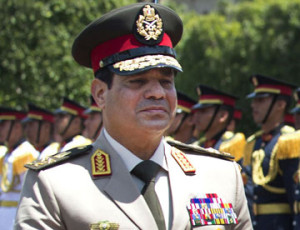Egypt will elect a president before voting on a parliament, interim President Adly Mansour said on January 26, amending a road map laid down last summer.
Parliamentary elections were supposed to be held first under a timetable agreed to after Egypt’s army deposed Islamist President Mohamed Morsy in July following mass protests against his rule.
Voters in the Arab world’s most populous nation this month overwhelmingly approved a new constitution with 98.1% in favor, the Electoral Commission said.
“I had previously held a series of sessions for dialogue with some of the major political stakeholders and representatives of the different political groups which indicated a majority in favor of holding presidential elections first,” Mansour said in a televised address.

Egypt’s army chief Gen. Abdel Fattah el-Sisi
“In this light, I have taken the decision to amend the road map for the future, so that presidential elections are held first, and are followed by parliamentary elections.”
Mansour did not give dates for the elections.
Egypt’s army chief Gen. Abdel Fattah el-Sisi has said he would run for president if the Egyptian people wanted him to, state media reported recently.
ETHIOPIA and EGYPT – Battle of the Nile: Egypt, Ethiopia clash over mega-dam
KHARTOUM, Sudan | Egypt and Ethiopia remain at loggerheads over Addis Ababa’s plan to build a $4.2 billion, 6,000-megawatt dam on a major tributary of the Nile River that Cairo says will greatly reduce the flow of water that is Egypt’s lifeline.
Tension between the two African states rose sharply in January after Ethiopia rejected Egypt’s demand it suspend construction of the Grand Ethiopian Renaissance Dam on the Blue Nile, the main tributary of the 4,130-mile river, the world’s longest.
 Egypt has vowed to protect its “historical rights” to the Nile “at any cost” and says it could lose 20 percent of its water if the giant dam in northwestern Ethiopia, one of several hydroelectric projects planned by Addis Ababa, is completed.
Egypt has vowed to protect its “historical rights” to the Nile “at any cost” and says it could lose 20 percent of its water if the giant dam in northwestern Ethiopia, one of several hydroelectric projects planned by Addis Ababa, is completed.“It would be a disaster for Egypt,” Mohamed Nasr Allam, a former Egyptian water minister, lamented to the Guardian daily of London in 2013. “Large areas of the country will simply be taken out of production.”
Despite Cairo’s tough declarations, and Addis Ababa’s insistence on pressing ahead with the massive dam — which it denies will damage Egypt to any critical extent — there’s little likelihood of the two states going to war, if only because of the vast distance that separates them. …
Ethiopia’s Chinese-backed dam program will, if completed, produce abundant supplies of electricity that could transform the economies of the regional states long mired in poverty.
Egypt’s position has been seriously weakened by the December defection of Sudan, its southern neighbor and longtime ally, in the Nile dispute with Ethiopia and other upstream African states.
That has left Egypt isolated in a long-running dispute with those states, which all want a greater share of the Nile water than they are accorded under British colonial era agreements that gave Egypt, and Sudan to a lesser extent, the lion’s share of the river’s flow. …
In 2010, Ethiopia, Rwanda, Tanzania, Uganda and Kenya signed an accord, the Cooperative Framework Agreement, to negotiate a more equitable water-sharing arrangement. They were later joined by Burundi , the Democratic Republic of Congo, Eritrea and South Sudan.
These upstream African nations, former colonies of the 19th century European powers, all say they need greater access to the Nile’s flow to meet swelling demographic and industrial demands from a waterway that has sustained civilizations for millennia.
Much depends on how the current dispute plays out. Right now, an estimated 238 million people depend on the Nile to some extent.

No comments:
Post a Comment